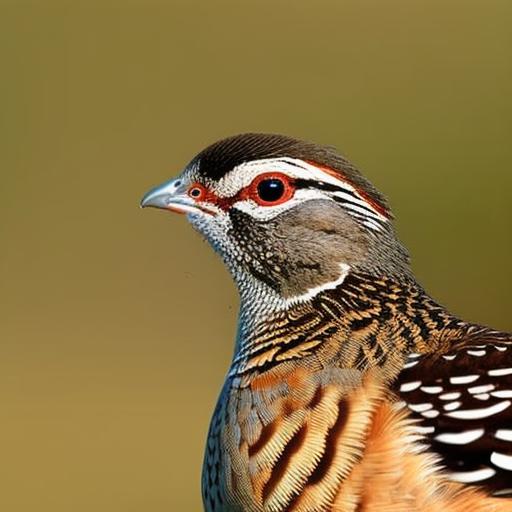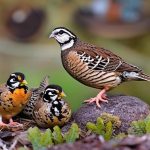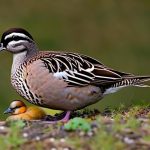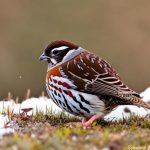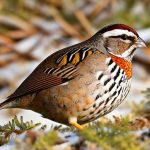Quail keeping is a rewarding and enjoyable hobby that has been gaining popularity in recent years. Quails are small, ground-dwelling birds that are known for their delicious eggs and meat. They are relatively easy to care for and can be kept in a backyard or on a small farm. Quails are also known for their gentle nature and can be a great addition to any homestead or farm.
Quail keeping can be a great way to provide your family with fresh, organic eggs and meat. Quails are also known for their ability to forage for food, making them a sustainable and cost-effective option for those looking to raise their own food. Additionally, quails are relatively low maintenance and can be a great option for those who are new to raising poultry. With the right knowledge and preparation, quail keeping can be a fun and rewarding experience for anyone looking to add a unique and productive animal to their homestead.
Key Takeaways
- Quail keeping is a rewarding hobby that requires proper knowledge and care to be successful.
- When choosing a quail breed, consider factors such as egg production, temperament, and size.
- Creating an ideal quail habitat involves providing adequate space, shelter, and protection from predators.
- A balanced diet with the right nutrients is essential for the health and productivity of quails.
- Preventing diseases through proper hygiene, vaccination, and regular health checks is crucial for successful quail keeping.
Choosing the Right Quail Breed
When it comes to choosing the right quail breed for your needs, there are several factors to consider. Different quail breeds have different characteristics and are suited to different purposes, so it’s important to do your research before making a decision. Some popular quail breeds include the Coturnix quail, Bobwhite quail, and California quail.
The Coturnix quail is one of the most popular breeds for backyard quail keeping due to its small size, gentle nature, and high egg production. The Bobwhite quail is known for its delicious meat and is often raised for hunting purposes. The California quail is a popular choice for those looking to raise quails for ornamental purposes, as it is known for its beautiful plumage. When choosing a quail breed, it’s important to consider your specific needs and goals for raising quails. Whether you’re looking for eggs, meat, or simply a beautiful addition to your farm, there is a quail breed that is right for you.
Creating the Ideal Quail Habitat
Creating the ideal habitat for your quails is essential for their health and well-being. Quails are ground-dwelling birds that require plenty of space to roam and forage for food. When designing a habitat for your quails, it’s important to consider factors such as space, shelter, and protection from predators.
Quails should be provided with a spacious outdoor area where they can roam and forage for insects, seeds, and plants. Additionally, they should have access to a sheltered area where they can rest and seek protection from the elements. It’s also important to provide your quails with protection from predators such as foxes, raccoons, and birds of prey. This can be achieved by using secure fencing and providing your quails with a safe and secure coop or shelter. By creating an ideal habitat for your quails, you can ensure that they are happy, healthy, and productive.
Feeding and Nutrition for Quails
Feeding and nutrition are crucial aspects of quail keeping that can have a significant impact on the health and productivity of your birds. Quails are omnivorous birds that require a balanced diet of grains, seeds, insects, and plants. It’s important to provide your quails with a high-quality commercial feed that is specifically formulated for their nutritional needs.
In addition to commercial feed, quails should also be provided with access to fresh water at all times. It’s also beneficial to supplement their diet with treats such as mealworms, fruits, and vegetables to provide them with additional nutrients and enrichment. It’s important to monitor your quails’ food intake and adjust their diet as needed based on their age, activity level, and overall health. By providing your quails with a balanced and nutritious diet, you can ensure that they are healthy, happy, and productive.
Health and Disease Prevention for Quails
Maintaining the health of your quails is essential for their well-being and productivity. There are several steps that can be taken to prevent disease and ensure that your quails are healthy and thriving. One of the most important aspects of quail health is maintaining a clean and sanitary living environment. This includes regularly cleaning their coop or shelter, providing fresh bedding, and ensuring that their food and water sources are clean and free from contamination.
It’s also important to monitor your quails for signs of illness or injury and seek veterinary care if needed. Additionally, practicing good biosecurity measures can help prevent the spread of disease among your quails. This includes limiting exposure to wild birds, quarantining new birds before introducing them to your existing flock, and practicing good hygiene when handling your quails. By taking proactive measures to prevent disease and maintain the health of your quails, you can ensure that they live long, healthy lives.
Breeding and Reproduction of Quails

Breeding and reproduction are important aspects of quail keeping for those looking to expand their flock or raise quails for eggs or meat production. Quails reach sexual maturity at around 6-8 weeks of age and can begin laying eggs shortly after. When breeding quails, it’s important to provide them with a suitable nesting area where they can lay their eggs in privacy.
Quails are prolific layers and can produce a large number of eggs throughout the year. It’s important to collect their eggs regularly to prevent them from becoming broody and to ensure that they remain healthy and productive. If you’re looking to hatch quail chicks, you can either allow your quails to incubate their eggs or use an artificial incubator. By understanding the breeding and reproduction process of quails, you can successfully expand your flock and enjoy the benefits of raising these productive birds.
Tips for Successful Quail Keeping
There are several tips that can help ensure the success of your quail keeping endeavors. First and foremost, it’s important to do thorough research before getting started with quail keeping to ensure that you have the knowledge and resources needed to care for these birds properly. Additionally, providing your quails with a clean, spacious habitat that meets their specific needs is essential for their health and well-being.
Regularly monitoring your quails for signs of illness or injury and seeking veterinary care when needed can help prevent disease and maintain the health of your flock. It’s also important to handle your quails gently and provide them with plenty of enrichment to ensure that they are happy and well-adjusted. By following these tips and being proactive in caring for your quails, you can enjoy a successful and rewarding experience raising these unique and productive birds.
Check out this informative article on how to convert a shed into a chicken coop at Poultry Wizard. It provides valuable insights and practical tips for creating a comfortable and functional living space for your quails.
FAQs
What are some basic tips for keeping quails?
– Provide a suitable living environment with enough space, proper ventilation, and protection from predators.
– Feed them a balanced diet that includes commercial quail feed, fresh water, and occasional treats like fruits and vegetables.
– Monitor their health and behavior regularly to catch any issues early on.
– Handle them gently and minimize stress to ensure their well-being.
What should I consider when building a quail enclosure?
– The enclosure should be spacious enough to allow the quails to move around freely.
– It should have proper ventilation to maintain air quality and prevent the buildup of ammonia from their droppings.
– The enclosure should be secure to protect the quails from predators and escape attempts.
– Provide areas for nesting, roosting, and dust bathing to accommodate their natural behaviors.
What do quails eat and drink?
– Quails primarily eat commercial quail feed, which is formulated to meet their nutritional needs.
– They also enjoy eating small insects, seeds, and greens, so providing a varied diet can be beneficial.
– Fresh water should be available at all times, either through a waterer or shallow dish, and it should be changed regularly to prevent contamination.
How can I ensure the health and well-being of my quails?
– Regularly clean their living environment to prevent the buildup of waste and bacteria.
– Monitor their behavior and appearance for any signs of illness or distress.
– Provide a balanced diet and access to clean water.
– Handle them gently and minimize stress to promote their overall well-being.
What are some common health issues in quails?
– Respiratory infections
– Parasitic infestations
– Egg binding in females
– Nutritional deficiencies
– Injuries from fights or rough handling
Meet Walter, the feathered-friend fanatic of Florida! Nestled in the sunshine state, Walter struts through life with his feathered companions, clucking his way to happiness. With a coop that’s fancier than a five-star hotel, he’s the Don Juan of the chicken world. When he’s not teaching his hens to do the cha-cha, you’ll find him in a heated debate with his prized rooster, Sir Clucks-a-Lot. Walter’s poultry passion is no yolk; he’s the sunny-side-up guy you never knew you needed in your flock of friends!

